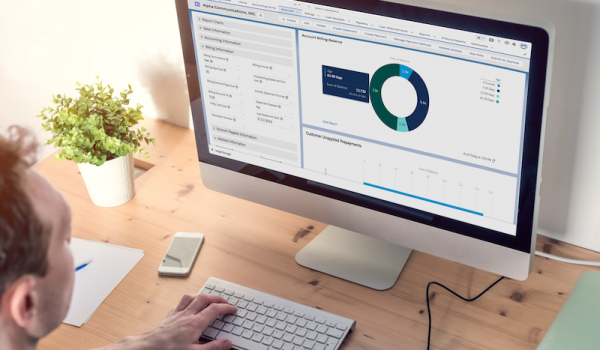
Science and technology are rapidly advancing with the use of robots. In fact, some employees are worried about the human element disappearing completely from key business roles. In the financial world, accounting software is poised to become even faster and less labor demanding in the next several years.
One thing remains certain, as accounting technology evolves, so will the role of the accounting team. However, there remains a need for actual accountants to make sense of finances, even in the midst of innovation.
The Tools of Change
Instead of thinking that technology will eliminate or reduce human involvement, look at it as a resource that expands the scope of the financial expert. Accounting practices haven’t dramatically changed in the last few years, but technology has revolutionized how efficiently accounting processes can be done. For an accounting team, remaining valuable means embracing the tools of the future including automation, the cloud, and artificial intelligence.
Automation allows software to streamline key accounting processes such as billing and payments because human interface is heavily reduced, eliminating the need to re-enter data to produce repeatable tasks. This minimizes the workload, increases data integrity, and makes tasks related to bookkeeping easier. Due to this advantage, automation will continue to increase. In a report by Accenture, it’s estimated that by 2020, 40 percent of transaction accounting will be automated. However, recording transactions is only one aspect of the accounting team’s role. Another crucial role of the accounting team is that of advisors, using the information gained from financial transactions to provide insight which can improve business strategy.
As automation progresses, the repetitive aspects of journal entries become faster and less reliant on human action, but this means that financial experts can work faster too. Accounting teams will spend less effort putting in the numbers and more time analyzing them.

The Cloud
The Cloud is already a leading innovation as more and more companies rely heavily on cloud-based applications and services. In the same report compiled by Accenture, up to 85 percent of CFOs are planning future investments in the cloud. Cloud-based platforms and applications will continue to surge in popularity, overtaking older legacy systems because of their flexibility, speed, and accessibility, as well as their ability to be quickly upgraded. We will see core functions like analytics and reporting shift even further towards cloud computing programs, which includes accounting. This is happening now and will continue to accelerate, giving accounting teams more tools and opportunities to work with.
The cloud lets financial data be accessed by staff anywhere, collected from other cloud-based software, and stored in a single solution, like Accounting Seed. This gives businesses more control over their financial management while expediting the process as a whole. Finances can be updated and managed all online and in near real-time through automation too. The cloud will be a major vehicle in helping accounting teams get results closer and closer to actual real-time which will become a major demand for business leaders. As more businesses use the cloud, and automation continues to improve, accounting teams can optimize their workflow and provide better insight because the key information will be more readily available.
Artificial Intelligence (AI)
Artificial Intelligence (AI) continues to show it’s prominence in the next generation of business software. In the accounting world, we’ll likely to see this increase through such technology as Robotics Processing Automation (RPA). RPA is software that combines machine learning capabilities and AI to automate rule-based processes. This can range from processing transactions to generating automatic responses. The ability for a program to self-learn improvement opportunities or prevent mistakes is desirable in accounting as it reduces the amount of time spent on basic processes of transaction recordings and distributions. This doesn’t render accountants useless. Rather, AI helps financial experts do their job more efficiently because no time is wasted. AI makes the job faster, it doesn’t destroy it.
You’ll Still Need Accountants
Ultimately, accounting software is a tool. You still need to know how to use it, and even then, it requires detailed analysis to make use of the data. As technology develops, the technical aspects of accounting become easier and faster, but this simply means the accounting team can serve more a group of guides or consultants (which is ultimately what you really want).
Total reliance on AI or other technology, in general, is not the solution for progress. Removing the insights of human accountants is unwise. Even with the raw processing power of an automated, cloud-based system, good direction from the human is still necessary. Software can’t yet define strategies for cutting costs or provide insight into how to conserve more revenue to reach business goals. It’s up to the accounting team, harnessing the technology, to be the brains behind the machine.
The Evolution of Accounting
With the accounting team’s role evolving more towards analysis and strategy, accountants will need to collaborate more closely with different professionals such as software specialists. In addition to financial analysis and advising, accounting work may grow to report on the effectiveness of tools and individuals in gathering financial data or for quality control. The accounting business will change, but this has the potential of expanding the role of accountants. For the accountant team, mastering the latest technology trends and embracing innovation will empower their career to new heights and ensure their continued relevance.
A native Salesforce accounting app, Accounting Seed, provides a full 360-degree view of your business’ performance to help you and your accounting team make the best decisions possible. Not on Salesforce? Our software can be customized to work with any system you have through a reliable connection.
See Accounting Seed in action
Get a close-up view of how accounting on Salesforce can eliminate the need for costly integrations—and silos of mismatched information—by sharing the same database as your CRM.


